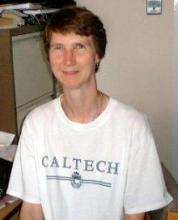
Prof. Irene M Moroz
CUF Lecturer in Mathematics
Applied Mathematics Fellow, St Hilda's College

CUF Lecturer in Mathematics
Applied Mathematics Fellow, St Hilda's College
My main research interests lie in the bifurcation analysis of nonlinear ordinary differential equations, arising in dynamo models and low order models of plankton. My background is in Geophysical Fluid Dynamics. Current exciting areas of research include comparisons detween deterministic and stochastic parameterisation schemes for both low order differential equations and the Integrated Forecasting System of the European centre for Medium Range Weather Forecasting. Also, investigation of models for the synchronisation between the Quasi-Biennial Oscillation and the Semi-Annual Mode. These are exciting areas of research for potential DPhil students.
I am also a member of the Mathematical Geoscience Group (MGG) and the Applied Dynamical Systems and Inverse Problems research group (ADSIP) in the Oxford Centre for Industrial and Applied Mathematics (OCIAM), and the Oxford Climate Network.
Current NERC-funded four year DPhil studentship on the stability of continuously stratified zonal jets near the equator. NERC Industrial CASE Studentship with the Meteorological Office.
Students
Recent and current D. Phil students with completion dates where appropriate are:
- Adam Stephen (POD methods in baroclinic flows): 1997
- Stephen Whitehouse (POD-Galerkin Modelling of the Martian Atmosphere):
1999- Sithi Muniandy (Wavelet-Galerkin modelling of turbulence): 1998
- Isla Gilmour (Nonlinear prediction of baroclinic flows): 1998
- Richard Harrison (Numerical study of the Schrodinger-Newton equations): 2001
- Edgar Perez (Eddy flux parameterisation in models of baroclinic flow and in the oceans) : 2006
- Christina Orphanidou (Voice Morphing):2007
- Max Little (Nonlinear modelling of speech) :2007
- Oscar Martinez-Alvarado (Modelling of the Martian Atmosphere):2007
- Reason Machete (Nonlinear analogue and digital time series analysis):2007
- Xiaodong Luo (Filter analysis in Data Assimilation)
- Judy Simpson (Finite dimensional dynamics in baroclinic chaos)
- Trevor Wood (Mathematical Modelling of Sonar and Radar Contact Tracking)
- Lian Duan (KAUST-sponsored in Oil Field History matching)
- Hannah Arnold (Stochastic Parameterisation in the Lorenz 1996 model)
- Sean Lim (BP-sponsored in full-waveform inversion)
- Kylash Rajendran (Modelling of the quasi-biennial oscillation)
Research Interests
Research Group Link
Geophysical fluid dynamics, baroclinic flows, stochastic parameterisation and planetary atmospheres
We are interested in building on the results of two existing DPhil studies into the use of empirically determined basis functions, calculated from time series of the velocity fields to generate reduced order nonlinear models of baroclinic flows. These include numerical models of the Martian atmosphere with and without topographic features, as well as laboratory models of more complicated baroclinic flows. We are currently comparing deterministic with stochastic parameterisations of physical processes using the Integrating forecasting model of the European Centre for Medium range weather forecasting.
Selected references
Hide (1997) has proposed a hierarchy of related self-exciting coupled Faraday-disk dynamos incorporating electric motors as additional electromechanical elements and driven by steady mechanical couples has been proposed. Each system comprises N interacting units which can be arranged in a ring or a lattice. Within each unit are electric motors, driven into motion by the dynamo and connected either in series or in parallel with the coil. Nonlinearity enters solely through the coupling between components. By introducing additional terms into the equations, it is possible to include the effects of biasing from impressed electromotive forces due to thermoelectric or chemical processes, as well as from the presence of ambient magnetic fields. Dissipation is introduced into the models via ohmic heating and mechanical friction in the disk and motors, with the latter playing a crucial role in the generation of chaos (see e.g. Hide et al (1996)).
Ideas from the topological analysis of chaotic systems have been used to classify the attractor of the Hide et al (1996) dynamo as being equivalent to the Lorenz attractor (Moroz, 2007). Furthermore such ideas have been used to determine the templates of other dynamo models.
Relevant references
Publications
[an error occurred while processing this directive]Tel: 01865-2-70514
E-mail: moroz@maths.ox.ac.ukNovember 2017